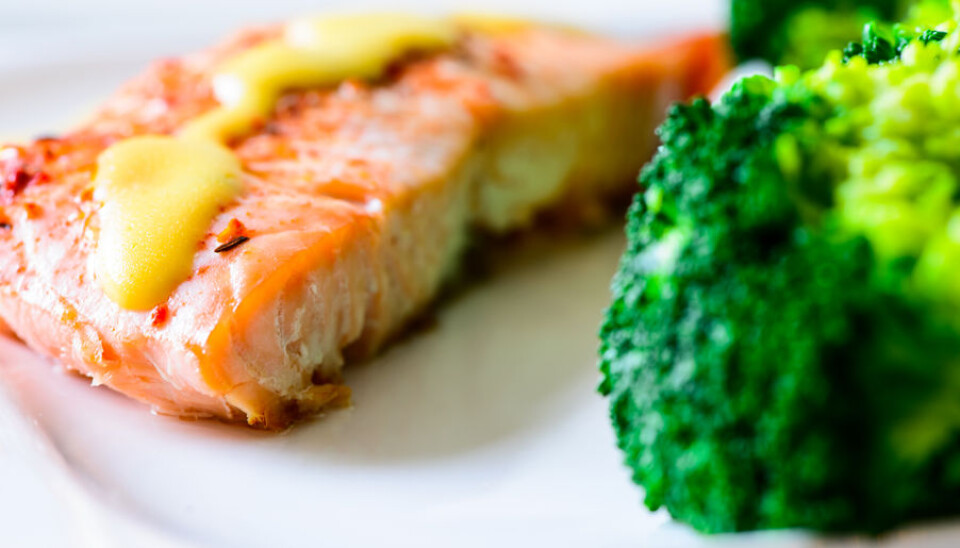
Trim your body with the right trimmings?
The amount of weight you gain depends on what you eat along with fatty foods.
Denne artikkelen er over ti år gammel og kan inneholde utdatert informasjon.
The amount of time it takes for fat to be digested and readied for use or storage in the body appears to depend on what is eaten at the same time.
Research by Kristi Ekrann Aarak of the Norwegian University of Life Sciences (UMB) suggest that we assimilate less of the fat in salmon if we eat some broccoli along with it.
Fats – lipids – have both good and bad effects on the body. They are energy sources. Certain important vitamins are soluble in fats, and they are vital signal molecules that help the body to communicate. But eat too much fatty food and you are likely to put on unwanted and unhealthy weight.
“For this reason, many people have studied whether or it is possible to lower our fat intake to hinder us from overeating,” says Aarak.

But Aarak has focused on whether it is possible to affect the way the body digests fats so that it sends signals to our brains that make us feel full and consequently put down our knife and fork a little sooner.
Artificial digestion
She has experimented with this by using an artificial digestion system. The food is first prepared just as we would at home in the kitchen.
But then it is sent through a chewing machine for two minutes, which mixes in simulated saliva, before the food is passed on to an artificial stomach and pseudo-intestines.
Scientists often work with powders and artificial substances in experiments like th. Kristi Ekrann Aarak has gone in for more realism. She has used completely normal salmon, broccoli and pearl barley like we find in any supermarket.
It turns out that the fat is digested differently if the salmon is eaten on its own, together with the broccoli, with the barley or with both.
In other words, a calorie doesn’t always behave like a calorie. When the fat is digested slowly, the body starts up a mechanism which tells the brain when it has had enough food.
“Since different effects are in play it’s likely that the components affect digestion. Initially they affect the feeling of satiation, so we eat less,” explains Aarak.
Dietary advice
Her experiments will not be leading to modifications of Norwegian nutritional advice until comparable studies have been done with real people. But this is a step on the road to dietary recommendations that pay more attention to food combinations – the complete design and composition of a meal.
“The responses I’ve received concur that it’s important to get the whole picture of a meal and show that there are differences. If you add some broccoli consumption along with the fats it has an effect on what the body absorbs.”
Aarak thinks this shows it is much preferable to plan the right meal than to swallow diet pills.
“Another advantage is that when we tailor a meal by adding these components, we also get extra vitamins and minerals.”
“It’s been shown previously that this helps us keep our weight down better than if we ate at McDonald's and took a diet pill on the side,” she says.
The international foodstuffs industry launched the first products years ago which contained about the same amount of fat as competitor foods, but that were manufactured in a way to block the body from absorbing the fat.
“Various diet pills have been on the market but most have been withdrawn. When you examine them closely you find that they have too many negative qualities.”
“The idea behind the project was to use components that are naturally found in foods that provide the same effect, but without the negative consequences,” says Aarak.
Intestines are underestimated
In another experiment related to her PhD work, Aarak compared enzymes from humans and pigs to learn more about how they absorb omega-3 fatty acids.
“It turned out there were big differences. We found an increased release of omega-3 fatty acids in the human enzymes. This might explain effects which have previously been a mystery regarding omega-3 supplements.”
“The difference is that the intestines are underestimated and human enzymes are better at making omega-3 accessible for the body,” says Aarak.
------------------------
Read the Norwegian version of this article at forskning.no
Translated by: Glenn Ostling


































